
CHRISTINE PEDI
Funny gal Christine Pedi, whose impressions of a host of Broadway leading ladies have earned her raves in more than a dozen companies of Forbidden Broadway, is doing double-duty these days appearing in the Off-Broadway productions of both Miss Abigail's Guide to Dating, Mating & Marriage! (Saturdays at 5 PM at the Downstairs Cabaret Theatre at Sofia's) and NEWSical the Musical (eight times a week at The Kirk at Theatre Row). Pedi, who has been seen on Broadway in Talk Radio and in the Martin Short revival of Little Me, is also offering her critically acclaimed holiday solo show There's No Bizness Like Snow Bizness, which will play its final performance Dec. 26 at 7:30 PM at Don't Tell Mama. Last week, I had the pleasure of chatting with the Drama Desk and Ovation Award nominee, who spoke about her current jobs, her road to Forbidden Broadway and more; that interview follows.
Question: Although we've e-mailed, we've never spoken before, so let's go back to the beginning. Where were you born and raised?
Christine Pedi: I was born at a hospital in Yonkers, but I started out in the Bronx for the first couple of years with my family. Then we moved to Eastchester, NY.
Question: When did you start performing?
Pedi: Well, I did the high school plays. I went to a parochial girls school. I did the high school plays at the local boys school. They'd farm in the girls from the local schools. The first musical I did was at my high school—an all-girls version of Godspell. They brought in one boy to be Jesus because they weren't that cutting edge—having a girl be Jesus. After that, I did the plays at the boys high school—that was a big thing to do—auditioning and waiting for the list to come up and all the drama and so forth, wondering if you were cast or not. The first show I did was Bye Bye Birdie in the chorus. I wore one of the bridesmaid dresses from my mother's wedding. She was actually married the year Bye Bye Birdie opened on Broadway. Then I was in the chorus of Very Good Eddie. God only knows why, but it had been on Broadway, I guess… Then I got the lead my senior year—not the lead, but I got a lead in Hello, Dolly! Back then I was singing soprano because I had taken singing lessons. The director of Godspell said to my mother, "She should take singing lessons." She recommended a sweet old—not old, but to me she was old because I was 14 or 15—[woman named] Evelyn Hancock, and she was the second Laurie in Oklahoma! So, I was learning soprano, and she was teaching me Italian art songs and "We Kiss in the Shadow." I didn't know from belting… I never belted a note until I was in college. I didn't even know I could.
| |
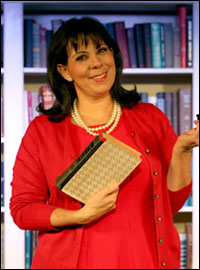 |
|
| Pedi in Miss Abigail's Guide. | ||
| photo by Jeremy Daniel |
Pedi: You know, I have this radio show on Sirius XM Radio. I play show tunes six hours a day and talk about them. I think back to when I was in grammar school and high school. In particular, high school would have been the formative years for me. There were not a lot of performers certainly on the radio that inspired me, and I didn't really know what a Broadway show was until high school—didn't see one until high school. It was just all flooding in very quickly, but it's almost as if the recordings were the stars for me. And, the stars on the recordings, obviously. Who didn't love Liza Minnelli or listening to Chita Rivera in Bye Bye Birdie or Rex Harrison in My Fair Lady—it was the whole package, honestly. There were the usual suspects as far as divas that just thrilled me to no end like Liza and Bernadette [Peters] and Chita. Bette Midler, when I was growing up, was a bit of a sanctuary. She would sing the "Boogie Woogie Bugle Boy," and that was on the radio, and it would make me feel validated. Anyway, even somebody like Barry Manilow, in his own way, played songs that, to me, were approachable, in a world where I didn't get to see any Broadway and I didn't feel like music I liked was validated by my friends—this goes through college as well, of course. I think the plays and the composers and the stories, they were more my influences than necessarily the people… I mean I paid close attention to the people, but I never got obsessed about the people—like I never got obsessed about Donny Osmond or David Cassidy. Loved them, but never lost my mind.
| |
 |
|
| Pedi sings at Birdland |
Pedi: Well, when I went to college, there was an amazing radio station at Fordham University. I had never really thought about it because I didn't know how you got into radio. When you're getting ready to go to college… I was 16-years-old when I was looking at colleges. What the hell does a 16-years-old know about anything? Most of the time. [Laughs.] So, I was limited to the colleges we could afford, and Fordham was one of them, and I thought, "This would be, certainly, a valid place to go." And then, on the tour, they took us to WSUV, the radio station, and I said, "What is this?" And, they said, "This is a student-run radio station," and I thought, "What? I can be on the radio? I can play here?" And, that was it. That sold me on Fordham, and from my first day at Fordham, I lived at the radio station—lived there. I still have my closest friends are from the radio world there. It was my clubhouse. It was my dorm. It was everything because I was a commuter student. And, I became the arts editor, which meant that I discovered, much to my glee, that I could get press seats to plays, so I was going to see two and three Broadway plays and Off-Broadway plays a week. I was insatiable, and they had a van—they still have it, I think—called the Ram Van because of the Fordham Rams—that's their mascot. So, they had this van called the Ram Van, which takes you from the Bronx campus to the Lincoln Center campus. I was in the Bronx campus. I would take the Ram Van into the city and go see my plays, and take the Ram Van back to the Bronx, and that was my routine.
Because I was seeing so much theatre, and I was hosting a radio show about the theatre, and I did a lot of special programming about the theatre, I really started to have this sort of longing. Again, I wasn't singing or anything. I had done the high school plays—I wasn't a performer [in college]. After I graduated, I got a job with the March of Dimes. I temped there, and then I got a full-time job working with their telethon. While I did that, I auditioned for community theatre, and that's where it really began… The first community theatre that I did was Mack & Mabel, and I got the lead, and I was thrilled to actually sing those songs that I loved so much—sing them out loud, have them come out… It was the first show I ever did where I belted, and I had interviewed Jerry Herman in college, so I called him up, which was, you know, just too exciting for words, and he could not have been more thrilled to hear from this total stranger that he talked to half an hour once a few years earlier. He said, "Oh, you're doing Mack & Mabel! Who's playing Mack?" And, I said, "Jeff Schlotman." And he said, "Tell Jeff that he's got to…" And, he was giving us ideas and choices about how to play it. He was so excited. What a dear, dear, dear, dear sweet man. I did Mack & Mabel and then I did Funny Girl and then I did Evita and I did Little Shop of Horrors and I did Night Music, and I just went from one great part to another in these very, very good community theatres—many of them had quite a budget. John Treacy Egan and I started there. John Treacy Egan was my Che in Evita at the Chappaqua Drama Group where the Clintons lived—I don't know if they still live there—and a bunch of other people in theatre, but John was the person that I became very friendly with in community theatre that went on to do wonderful things, and he's in Sister Act now.
| |
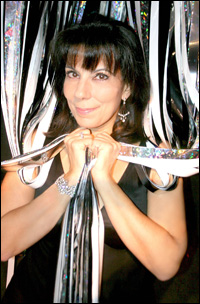 |
|
| Christine Pedi |
I had one final edition of "Backstage" that I was reading, and I opened it, and it had an audition for the national tour of Forbidden Broadway, and I said, "Oh, well that would be good for me I have a feeling… I think." I'd never done impressions before, but I said to myself, "But I made a pact! I just made a vow. I just took a vow." I looked up and said, "Okay, this is the last one! And, that's it!" And, I went, and there were like 200 girls, and they said that of the 200, I was their absolute first choice, and that was the beginning of my long, long relationship with Forbidden Broadway. It started with the national tour. It wasn't a bus-and-truck. We called it a bus-in-truck because there were the four performers, the pianist, the tech guy and the dresser, who was also our stage manager and general manager, and we were on a big bus, and the back rows of the bus were emptied out, and they put the set and the costumes… We toured for three months—104 nights on the road. We only had, I think, five days off without traveling or performing because it was non-equity. We went everywhere. We went from Florida to New England, the Northwest to Texas to California to Canada—we went everywhere, and it was a glorious opportunity to really see America from the road in a way that you can't do any other way, so it was quite wonderful.
| |
 |
|
| Pedi in Miss Abigail's Guide. | ||
| photo by Jeremy Daniel |
Pedi: Yeah. They just said to me at the audition, "Do you do any impressions?" And I said, "Well I do my Sicilian grandmother." And, they said, "Okay." And, I started breaking into her—"Christine, thanks to God I live-a near the church. I have to tip-a thee garbage man." She had a total vintage, thick, right-out-of-a-movie accent… And, I did that and they said, "Do you do Carol Channing?" And, I said, "Well, everybody does Carol Channing. That ain't hard!" I actually had met her because I was very big on volunteering my time when I was in college—and even out of college, even as a working person. If there was a big event going on, I would call up to volunteer, so I had volunteered at a glorious event at Lincoln Center to honor Jule Styne. I found myself, this is before I went into the business, backstage escorting Carol Channing and Dolores Gray and Comden and Green to their dressing rooms, and Stephen Sondheim and Liza Minnelli because I just wanted to circulate in that world and just be a part of it in some regard. I remember, years later, I did something at Avery Fisher Hall—it was for the Gay Men's Health Crisis, and it was a beautiful event called Show Stoppers—but I went through the stage door and I was escorted to a dressing room, and I shared a dressing room with Andrea McArdle and Melissa Errico and Chita Rivera and Carol Lawrence. You know, we were chatting and gabbing, and then I'm walking around and I went to another dressing room, and when I looked at that dressing room I realized, "Oh my God, this is where I first met Carol Channing, and this is where I was so happy to just be part of a production of such a caliber when I was so young. I can't believe…" It took me to that moment to remember, you know, a decade earlier or more—it was more than that—that I'd been there, but in very different circumstances, and who would have ever thought that I'd be there [performing]? That night, the people who were there were remarkable. Robert Morse, who means the world to me because How to Succeed… was the first musical—adult musical—that I ever connected with as a little, little, little girl, and Jerry Orbach, and when they came to me and said, "Christine, you're following Jerry Orbach." Again, I stopped for a minute and thought, "Wow." So, I had done my Carol Channing impression by telling the story of that event that I had been at where I took her into the dressing room and she wanted like a glass of water and said, "What is your name?" And, I said, "Christine." And she said, "Oh, Christine!" And, I said just hearing Carol Channing say my name was such a kick… And, they loved it, of course, because they appreciate that. It was a simple little story and it was true, and it was Carol Channing. And, they said, "How about Ethel Merman?" and they gave me a Patti LuPone song to take home—"Don’t Cry for Me Barbra Streisand" and a couple of other things, and that was that. I was with them for like, solidly, 15 years—nonstop for almost 10.
Question: If you're asked to impersonate someone that you haven't done before, what's your process of getting it down?
Pedi: There's not that much of a process, you know. In the beginning, it's obvious if I can really nail it or not. Some people grow on you. I couldn't do Oprah Winfrey in the beginning—not to my satisfaction. It was good enough, but it wasn't… Then I just really started watching her, because I'm a big fan, and I found that it really came through osmosis. I just let it seep in slowly. Oftentimes, if I can't do somebody as well as I want, if I watch someone else's impression, I know what to emphasize, and then other things come to me. Some people are naturally just well-suited to your voice and your instrument. There's some that were a big surprise like Angela Lansbury. I thought, "This is going to be a stretch, and it just better be a good number." A lot of times you don't need to have a dead-on impression in Forbidden Broadway. You just need the look, and the song takes you into that world and that atmosphere of the person, and you just have to be a solid musical theatre performer. You don't have to be a dead-on impressionist. But, I opened my mouth and I started doing it and I went, "Oh my God." And, John Freedson—the producer of Forbidden Broadway back then—is obsessed with Angela Lansbury. Obsessed, but obsessed to the point where it's unhealthy… He was thrilled, which meant the world to me. If he didn't like it, he wouldn't have kept the number in because she is sacred—absolutely sacred to him. And, some people get better. My Bernadette Peters I didn't think was very good in the beginning and then it just kicked in and I went, "Oh, that's what I got to do!" And, now it's one of my best impressions, so it's anybody's guess, but I never stop actually. I level off for a while, and then I'll revisit it and then something can come to me, but there's no real rhyme or reason.
| |
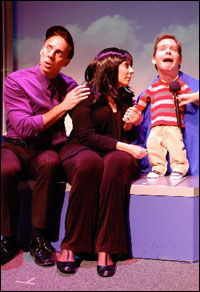 |
|
| Michael West, Christine Pedi and Rory O'Malley in NEWSical the Musical. |
Pedi: Well, singing as myself is a big issue because I'm singing a lot more as myself these days, and it's very difficult. I never had the opportunity to make choices as Christine—not for any lengthy periods of time. When you do a cabaret show for four or five nights, that's something, but it's not like some of these performers who go out there and they sing as themselves for long stretches and they're always doing it—so you can make vocal choices and stylistic choices and develop the sound that works best for you, mechanically. It's like, "Oh, I like that sound, but that's not comfortable, so I think maybe when I do it this way, this is the better way for me to sing these kinds of songs because it's better on my instrument." Well, I'm still working on that. I find it very hard to sing softly but with power, and that's something that I'm having trouble with in my own singing voice. Ask me to sing softly but with power as Barbra Streisand—no worries there, easy as pie! But, I can't do that when I'm being myself because then I'll just sound like Barbra Streisand, so I'm really working on that, and it's getting better, but it can be difficult to work on my own voice when I'm in the middle of… Right now I'm doing three shows at once, and it's got its challenges because I'm doing voices in NEWSical… I took two planes yesterday, and I did an hour-and-a-half show with all those impressions, and then I fly on Sunday on two planes, and then get off and do my Christmas show, and do probably 19 impressions. And then, cross the street and do NEWSical and do a handful more, and so my real voice takes a back seat. I don't get to cultivate it as much. I do sometimes feel that I hear something in my real voice on occasion, it doesn't happen often, that sounds like one of the impressions, and it creeps me out and I don't like it. [Laughs.] And, I stop it immediately.
Question: What's your performance schedule with NEWSical and Abigail? How many times a week are you doing the shows?
Pedi: Abigail is Saturdays at five o'clock, so I leave NEWSical at 4:35, I get to Abigail at 4:47—sometimes 4:49, give or take two minutes—and I have a whopping 15 minutes to change, mic up, change my dress, do my hair cause I have wig hair from NEWSical… put on my pearls, go over my lines. I would have gone over my lines during NEWSical backstage during my off moments. I run my script the night before and the day of. And then, they give me questions from the audience that I have to develop answers for, and then I pick one or two and I have to sort of improvise an answer in my head, so I do all that, and then we're off! Once I'm on stage, it's a real pleasant sanctuary because at least I'm not late and at least I know I'm there, and I have arrived and I don't have to obsess about "Am I going to get there on time?"
Question: I know with Abigail there is a lot of breaking the fourth wall and talking to the audience. Do you enjoy that?
Pedi: Well, it's kind of easy for me. I wondered about it, but I realize now that because I have the radio show… I don't know how to put it. I'm breaking the fourth wall although there's nobody on the other side to look at me in radio. But I'm used to talking to people. And, I didn't realize that it would be that natural, that it would be like a muscle memory kind of a thing. It's fine and great. I really enjoy it. And, it's a very different type of piece, so it makes for a welcome change on Saturdays.
| |
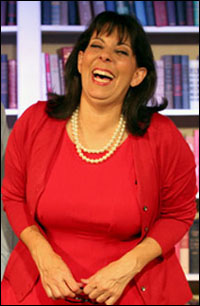 |
|
| Pedi in Miss Abigail's Guide. | ||
| photo by Jeremy Daniel |
Pedi: Well, I had seen Joyce DeWitt do it and I saw Laurie Birmingham, and it was wonderful to see two people do it because they were very different. Initially, when I saw Joyce I thought, "I'm not right for this." Joyce is darling. Joyce is sweet. And then I met Joyce, and she is even sweeter and more darling. She is as lovely as they come, and I'm not! [Laughs.] I thought, "Oh dear. What the hell?"… I don't see [Miss Abigail] as having any negative energy at all, and I know people like that. I marvel at them. [Laughs.] I don't understand them, but I just try to do that. Remember, I've only done six performances, so the part is still very, very new. I have a wonderful, wonderful co-star, Eddie Gutierrez, and he is a doll. It was the most stress-free experience that you can imagine. I just learned the script backstage and on the treadmill. I would read the script backstage during NEWSical, and I would read it on the treadmill. I learned it in about three weeks, and we only had about maybe three or four rehearsals. I think I had two rehearsals with Eddie, and that was that. It really has been such a comfortable environment, and the audiences love it, and it's different every week because there's different audiences—some drunker than others. [Laughs.] I'm still working on my choices with her, and that's the beauty of it—you can change it every week because it is so spontaneous, and sometimes somebody in the audience will say something and I will say something back, and I'll think, "Well, that was interesting. That was an interesting insight on how the character would respond." See, I'm sassier… I have more of a potty mouth, so my instincts must be squelched. [Laughs.] When people say things, I've just got to be as lovely as humanly possible because that's the kind of character she is. She just wants everyone to be happy and go forth and prosper and multiply and do so with a smile on their face and hope in their heart. It's hard for me to find the funny in that, but I try! [Laughs.]
Question: And with NEWSical, you're doing that eight times a week?
Pedi: Eight times a week, and then over the holidays, there's an amended schedule because I've taken time off to do my Christmas show because it's the same producer, so December is a hodgepodge of in and out of NEWSical. When we're back to a normal schedule, I will be doing NEWSical eight times a week and then, between the performances on Saturdays, I'll be doing Miss Abigail. That would be a normal week for me.
Question: What do you like about doing NEWSical? What does that give you a chance to do?
Pedi: Well, the first thing I think of when you say that is our wonderful cast and our company. Everyone loves everyone. We have a great rapport, we laugh backstage, our producer [Tom D'Angora] is the best producer I'll ever have—or any of us will ever have. He's funny, he loves us, he treats us beautifully. He's just so good to us. Honestly, when you're doing an Off-Broadway show, you're lucky to have the job—very true—but, it's also times are hard and none of us has any money, and we're all just trying hard to make ends meet. He always commemorates a birthday. He'll take us out. We hit our year anniversary of the show, and we're going out Monday night to celebrate that. He just loves honoring people that he loves, and he only surrounds himself with people that he loves. It's so true, I can't even tell you. And, we love that about him… He has an ability to surround us and himself with similar people. We just all get along, and I never take that for granted, and, trust me… there is no way of knowing what the chemistry of a cast and a company is going to be until they're all assembled together. Sometimes, one bad egg can really spoil what would otherwise be a perfectly content group of people, but it usually helps to have somebody at the top of the food chain there, in charge, who knows how to put like-minded people together, and that is the best part of the show. And, Rick Crom—lovely man. He is, of course, part of the whole company, and he writes fabulous stuff. We get material—it never has to be changed. It's always of a certain caliber, a certain quality… We know that we'll always be safe with his work, and that's the best part. The laughing—we laugh so much, offstage as well. We have a good time.
| |
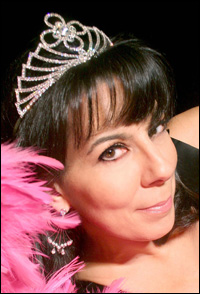 |
|
| Christine Pedi |
Pedi: My first Broadway show was Little Me with Martin Short and Faith Prince—the revival at the Roundabout.
Question: Do you remember your first night on Broadway and what that felt like to you, after probably thinking about what it would feel like?
Pedi: Well, it's a little different because you have your first preview… I don't remember too much about it, but I'm sure I can tell you that I was very in the moment thinking, "Here we go. Wow. This is happening." It's a little different when you are in the chorus. I didn't have that much to do in Little Me, so I wasn't that nervous… I wasn't a dancer, [but] I had a couple of lines. There wasn't that much to obsess about, but I certainly do remember being onstage before the curtain went up—well, we had no curtain… or did we? I don't even remember if we had a curtain! [Laughs.] Just, you know, being excited about it. It was finally happening.
Question: What are your holiday plans?
Pedi: Well, I just realized the other day, I've done this holiday show— There's No Bizness Like Snow Bizness. I have one more performance at 7:30 at Don't Tell Mama Dec. 26… I live in a small studio apartment in New York City, and I've done this Christmas show four years in a row at the Beechman, which is so cozy and it's got the Christmas lights, and it's warm, and it smells like butternut squash and cinnamon and vanilla when you come downstairs… And, I've realized something—this is really my way of entertaining, not just like as an entertainer who sings and tells stories, but as someone who doesn't have a [large] home of her own, and someone who isn't able to bring people into her home and celebrate the holidays because it's just too tiny. I never realized that, on some level, this is my way of doing that. Because everyone who comes, they come back year after year, they bring their family, they sit there and eat, there's such a sense of a party—of a Christmas family party—because it's relaxed and I talk to the audience, they talk back, and it's just fun, and it's got such a palpable sense of family and celebration. It wasn't until, truly, when I… walked into a gorgeous venue called the Columbia Club in Monument Circle in Indianapolis [where I was about to perform], and it's full of lights and wreathes and bows and warmth and celebration, and it's old and beautiful. I felt like I had come into this sanctuary. It's like when you walk into someone's house on the holidays after you've been out in the cold, and you're just so happy and everything smells good and it's pretty and twinkling. Well, I suddenly realized, "Wow, that is how I feel when I do the show." I feel like it's a home of sorts. It's a happy little sanctuary, and it's what I have to give at the holidays. I'd love to have people over and bake pies and make cookies and mull cider and do all that stuff because it's stuff that I've always wanted to do. I can't do that because, as I say, if I invite anyone into my apartment, I'll have to leave because it's so small. There's no room. So, that's my holiday plan. Also, I spend it with my family in Westchester. I have nieces and nephews that, some of which, are very young, and they still are very enchanted by waiting for Santa Claus. It's a big, big deal in our house. Big deal for my mother. My mother's house is out of a magazine. It's decorated within every inch of its life for the holidays.
[Downstairs Cabaret Theater at Sofia's is located at 221 West 46th Street, next to the Lunt-Fontanne Theatre. For ticket information visit www.MissAbigailsGuide.com or call toll-free (877) 9-MISS-ABIGAIL...Don't Tell Mama is located at 343 West 46th Street between 8th and 9th Ave. For reservations to There's No Bizness Like Snow Bizness, call (212) 757-0788 or visit www.donttellmamanyc.com... Theatre Row is located at 410 West 42nd Street. Tickets for NEWSical can be purchased through Telecharge.com or by calling (212) 279-4200 or (800) 432-7250.] Well, that's all for now. Happy diva-watching! E-mail questions or comments to [email protected].









